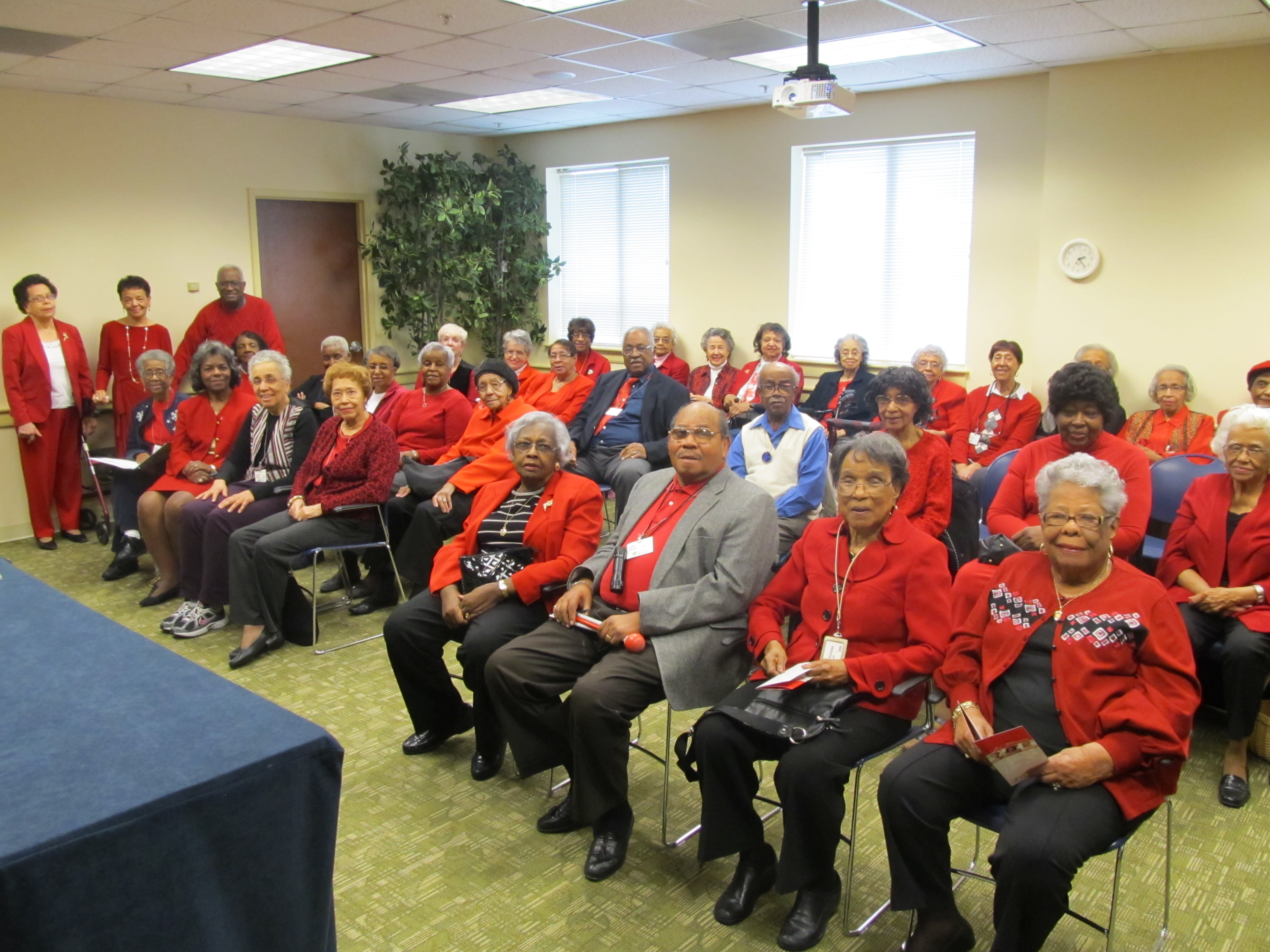
Riderwood Goes Red for Women
As a retired nurse educator from the University of District of Columbia, Barbara Baskerville knows that health awareness saves lives.

Resident members of the African-American History Club of Riderwood retirement community in Silver Spring wore red on February 6th to commemorate the American Heart Association’s national campaign, Go Red for Women. The event provided heart health tips, and attendees were encouraged to share the information with their friends and family to build awareness.
“Being informed about your health is a powerful tool,” stated Ms. Baskerville, a resident of Riderwood retirement community in Silver Spring who served twenty-one years as a nurse in the U.S. Army, both in active duty and the reserves. She is currently a member of the Resident Advisory Council, serving as its Liaison to the Medical Center.
That is why she enlisted the support of her fellow members of Riderwood’s resident-led African-American History Club to spearhead the American Heart Association’s Go Red for Women campaign at the Erickson Living community on February 6th. Charles Curry, MD, a resident of Riderwood and retired cardiologist from Howard University Hospital, served as the guest speaker.
Why a focus on heart disease by the African-American History Club? “The Heart Truth,” according to the National Heart, Lung and Blood Institute, is that heart disease disproportionately affects women of color. African-American women have higher rates of the major risk factors for heart disease than other ethnicities.
Donning their red attire, the group hosted a presentation on heart health, including talking with a physician about risk factors and setting heart health goals. Members received “red dress” pins and committed to sharing information about the topic with others.
“Heart disease has traditionally been viewed as an ‘older man’s disease,’ but that couldn’t be further from reality,” noted Ms. Baskerville. “The American Heart Association notes that cardiovascular disease claims the lives of 500,000 women in the United States annually so educational is vital. Further, since heart disease does not care how you look on the outside, the goal of the African American History Club is that all residents and staff will engage in heart healthy endeavors. We were pleased to be a part of the national Go Red for Women Day.”
Dr. Eugenio Machado, MD, agrees. A graduate of the University of Maryland Medical School, he has served as the Medical Director of Riderwood since 2003.
“There are many easy steps that people of all ages can take to improve heart health,” said Dr. Machado. He offered five proactive tips for achieving that goal.
Stay active. After consulting a physician, join a fitness center or exercise with friends. A goal of at least 30 minutes of moderate physical activity each day, five times per week, can lower risk for heart disease, stroke & diabetes and even improve memory.
Know and control your cholesterol. Cholesterol is a substance that is used by your body to make cell membranes and some hormones. But when you have too much cholesterol, it leads to plaque formation in your arteries, potentially causing blockages leading to heart disease.
Eat a healthy diet. Concentrate on eating vegetables, fruit, fiber-rich whole grain products, & fish at least twice a week and cut back on sugars & saturated fats.
Manage blood pressure. Know your numbers! Reducing sodium intake, maintaining physical activity and avoiding smoking help to keep blood pressure at an acceptable level.
Lose weight. The more weight you carry, the greater the risk for increased blood pressure, high blood cholesterol and diabetes. Even losing a few pounds can reduce an overweight person’s risk for heart disease dramatically.
The American Heart Association uses all revenue from local and National Go Red For Women activities to support awareness, research, education and community programs to benefit women. As a result, more than 2 million women have taken the Go Red Heart CheckUp in the last ten years. More information can be obtained at www.goredforwomen.org.

Engage us on Facebook
Follow us on Twitter
Tweets by @mymcmedia